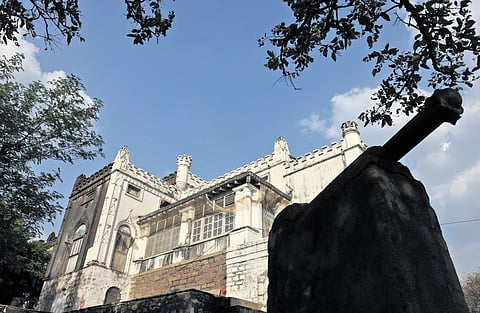

HYDERABAD: In the annals of Hyderabad’s history, few figures played a more crucial role than Moulvi Syed Muhammad Yusufuddin, whose life intertwined with the political machinations of British India in the late 19th century. His career as a top administrative officer in the Nizam’s government was replete with intrigue, daring exploits and legal battles and offers a glimpse into the complexities of colonial-era diplomacy and the resilience of Hyderabad’s nobility.
Born into a distinguished family in Hyderabad, Moulvi Yusufuddin embarked on a career in public service. His acumen and dedication saw him rise from a junior Talukdar to the position of Subedar of Gulbarga. Beyond his administrative roles, Moulvi Yusufuddin was a man with a visionary mindset; he was the first to propose the construction of a dam at Srisailam to benefit vast tracts of farmland and pioneered the design of an Urdu-script typewriter.
The political landscape of the time was fraught with challenges. Following the demise of Nawab Afzal-ud-Dowlah in 1869, the infant Nawab Mir Mahbub Ali Khan ascended as the Sixth Nizam of Hyderabad. A Council of Regency managed the state’s affairs until the young Nizam came of age. However, the greed of the British, who had expanded their control all over India, was insatiable.
Central to their evil designs on Hyderabad was Berar, a fertile region in present-day Madhya Pradesh. Historically, the Nizam had ceded Berar to the British under agreements that were supposed to be temporary. Despite repeated appeals by the Hyderabad government for its return, the British remained unwilling to let go of such a prized catch.
The persistence of the Hyderabad government forced the British to propose a deal: they would develop Berar using its revenues and, to finance this, would facilitate loans to the Nizam through their network of moneylenders. However, these loans came with inflated costs and opaque accounting, plunging Hyderabad into a debt trap. The culmination of this financial manoeuvring was an agreement that required the Nizam to cede Berar in exchange for debt clearance — a pact secured under dubious circumstances, with allegations suggesting the Nizam was inebriated at the time of signing.
Distressed by the almost-certain loss of Berar, the Nizam turned to Moulvi Yusufuddin, known for his problem-solving prowess. Recognising the gravity of the situation, Moulvi Yusufuddin volunteered for a perilous mission: to retrieve or nullify the contentious agreement before it could be ratified by the Viceroy in Shimla.
Aware that Shimla was the summer capital of the British government and that the Viceroy would spend the season there, Moulvi Yusufuddin preemptively established residence opposite the Viceroy’s quarters. By the time the Viceroy reached Shimla, Moulvi Yusufuddin had endeared himself to the Viceroy’s staff. He also capitalised on the British fondness for canines. The dogs procured by the Moulvi were of pristine breed, admired by every canine lover. This facilitated frequent interactions.
The specifics of how Moulvi Yusufuddin got his hands on the crucial agreement remain unclear. What is clear is that a chase followed, with the British hot on the heels of the officer from Hyderabad.
Somewhere during the chase, Moulvi Yusufuddin destroyed the agreement. There are varying accounts about how — some say he tore it and swallowed the bits, others believe that it was set alight. Some others believe that he managed to send it through a confidant to the Nizam to reassure the ruler. Regardless of the method, Moulvi Yusufuddin successfully thwarted the British plans to formalise the cession of Berar.
Well aware of the fallout, Moulvi Yusufuddin chose to face the consequences head-on. He allowed himself to be arrested on October 21, 1895, and searched. When the British could not find the agreement with Moulvi Yusufuddin, they booked him for abetting bribery. However, they could not even prove this charge since they could not admit that the agreement, which was nefariously obtained, even existed. Having no other option, on November 30, 1895, the British let Moulvi Yusufuddin go on bail.
This is exactly what Moulvi Yusufuddin wanted — to embarrass the British.
The fact that Moulvi Yusufuddin was arrested on railway property within the Nizam’s Dominions did not help the British cause. In his petition, Moulvi Yusufuddin raised questions about jurisdiction and the extent of British authority in princely states.
The ensuing legal battle reached the Judicial Committee in Kolkata. The crux of the matter was the legality of Moulvi Yusufuddin’s arrest on sovereign Hyderabad territory. The court concluded that, given the territorial sovereignty of the Nizam and the absence of explicit jurisdictional rights granted to the British over the railway lands, the arrest was unlawful. Consequently, all charges against Moulvi Yusufuddin were dismissed, marking a major victory against colonial overreach.
In 1897, he filed a case against the British government for wrongful arrest and named Queen Victoria the first respondent.
Moulvi Yusufuddin also sought compensation of Rs 3,81,500, a princely sum indeed. Unwilling to pay, the British appealed, and this case reached the Privy Council in Lahore. In 1900, the Privy Council upheld that the arrest was unlawful, but denied Moulvi Yusufuddin the compensation on the grounds of the statute of limitations.
Following his exoneration, Moulvi Yusufuddin chose not to resume his administrative duties.
Back in Hyderabad, a grateful Nizam offered him titles and land, which Moulvi Yusufuddin refused. Instead, he proposed that his accountant, Rustum ji, be given a title. Subsequently, Rustum ji became Rustum Jung. A year later, the Nizam again offered Moulvi Yusufuddin a title. This offer was politely refused, and the name of a scientist was proposed.
Irrepressible as ever, Moulvi Yusufuddin chose to channel his energies into other endeavours, including constructing the Yusuf Manzil. This edifice, perched atop a hillock in Tolichowki, Hyderabad, served as a farmhouse and later as a family residence. The surrounding area, known as Yusuf Tekri or Yusuf Tekdi, stands as a testament to his legacy.